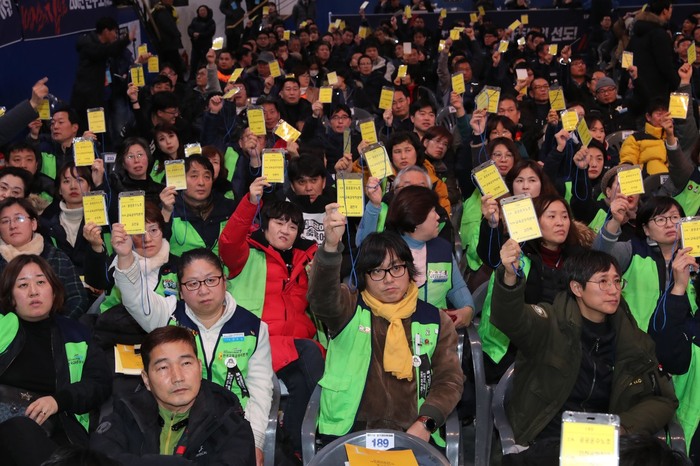Posted on : Jan.29,2019 18:26 KST
 |
|
Members of the Korean Confederation of Trade Unions (KTCU) hold a motion on whether to participate in the Economic, Social and Labor Council on Jan. 28. (Kang Chang-kwang, staff photographer)
|
In a meeting of delegates that lasted until late at night on Jan. 28, the Korean Confederation of Trade Unions (KCTU) basically decided not to participate in South Korea’s Economic, Social and Labor Council, a presidential advisory body for social dialogue. Though there are many other parties on the council, the reality is that the absence of the KCTU will undermine talks held at the council and any agreements it may reach. This is truly a disappointing outcome.
A total of four motions were tabled during the KCTU meeting, from a motion to join social dialogue submitted by the KCTU leadership, under Kim Myeong-hwan, to three revised motions, including a boycott of the dialogue. Considering that this was the delegate meeting that attracted the most attention in the KCTU’s history, nearly a thousand delegates attended, and a fierce debate continued until late at night. But since the delegates voted down all three of the revised motions without even putting the original motion to a vote and decided to submit the new business plan to an extraordinary meeting of delegates, the proposal for KCTU to join social dialogue was effectively scuttled.
This confirmed the sharp differences of opinion inside the labor community on this issue. Though South Korean President Moon Jae-in met with the leaders of South Korea’s two major umbrella labor unions (KCTU and FKTU) on Jan. 25 and strongly urged them to take part in the Economic, Social and Labor Council, his efforts were apparently inadequate. Whatever its reasons, the KCTU’s apparent refusal to join the council is unlikely to gain public support.
After converting irregular workers to regular workers in the public sector, dramatically increasing the minimum wage and capping the workweek at 52 hours, critics allege, the Moon administration has been “backsliding” by implementing corrective policies, and there’s something to be said for such criticism. One of the major factors here is the conservatives’ concerted attack on the minimum wage and income-led growth after the government’s jobs policy failed to accomplish much. Since the Economic, Social and Labor Council announced that its first order of business will be extending the period of flextime work, there have been increasing concerns by labor groups that they will play second fiddle if they join the council.
But the KCTU’s decision to torpedo the motion to join the Economic, Social and Labor Council because of such criticism and speculation can’t be regarded as appropriate. The fact is that, over the past twenty years, the labor question has gone beyond a dispute between capital and labor and become an issue for society as a whole. The question of the minimum wage, to take one example, isn’t just a matter of low-paid workers but is also tied up with the self-employed and small business owners, which inevitably leads to questions about whether society can handle additional increases. Different issues – including the national pension, the social safety net, and the effect of digital technological developments on employment – have different effects on the interests of each group.
Social dialogue is no panacea, to be sure, but there’s no alternative to debating these pressing issues in the public sphere. The major players in our economy need to consider once more why social dialogue is so essential to our society and to adopt a responsible stance.
Please direct comments or questions to [english@hani.co.kr]






